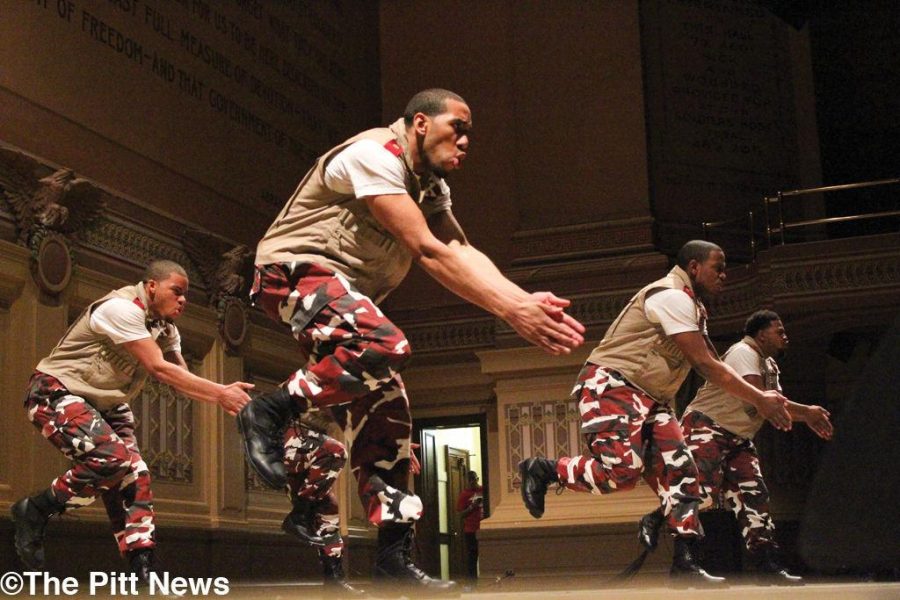Students step for heritage, competition
March 1, 2015
As fraternities’ and sororities’ shouts drowned out the announcer, Alpha Phi Alpha stomped its way to triumph in superhero garb.
Pitt’s National Pan-Hellenic Council, the Interfraternity Council and the Collegiate Panhellenic Association hosted the 18th annual Steel City Step Show in Soldiers & Sailors Memorial Hall from 6 p.m. to 9 p.m. on Saturday night. The Step Show “offers an opportunity for historically black Greek letter organizations from across Pittsburgh to interact and compete for the title of best fraternity and best sorority performance.”
Seven historically black Pitt fraternities and sororities competed in the event and took turns stepping — an African-American form of percussive dance. Steppers use their bodies to produce rhythms through footsteps, hand claps and spoken word. According to the Student Affairs website, dancers “might even play characters in small skits between steps … [and] many routines incorporate the precision and power of military drills.”
According to Stepafrika.org, stepping is based on a long and rich tradition in African-based communities that use movement, words and sounds to communicate allegiance to a group.
“The stepping tradition in the United States grew out of song and dance rituals practiced by historically African-American fraternities and sororities, beginning in the early 1900s,” the website says.
Alpha Phi Alpha came out on top and took the stage after playing a video spoof of a trailer for“The Avengers,” which portrayed the group as superheroes. The dancers wore matching black shirts with “The Avengers” logo.
“It was a way to get people hyped,” Robert Timmons, a senior majoring in electrical engineering — who dressed as Iron Man — said.
Although individuals can perform stepping, the dance is typically performed by groups of three or more.
The NPHC raised more than $5,000, which will go into the NPHC bank account and help to pay for the event, according to Haleigh Stapleton, a sister of the Zeta Phi Alpha sorority, who was responsible for making sure the event ran smoothly.
“It’s a show that ends up paying for itself,” said Stapleton, an undeclared sophomore.
For the second year in a row, Alpha Phi Alpha took home the trophy for best fraternity performance.
“But the team changes every year,” Timmons, one of Alpha Phi Alpha’s six new members, said. “So the win is still exciting.”
Although the night predominantly featured fraternities, two sororities also competed. Because of the limited number of sorority performances, there was no third place winner. Sigma Gamma Rho sorority won first place while Zeta Phi Beta won second place.
For the fraternity competition, Iota Phi Theta won second place. The group took the stage with aggressive attitudes and Kevlar-like vests. Performing cartwheels and human pyramids, the group often saluted themselves and the audience.
“Who’s the competition?” one of the performers asked.
“There is no competition,” the others replied in unison.
Third place went to Kappa Alpha Psi, which used dance movies and faux-news segments projected on the screen behind them to demonstrate the effects of a zombie apocalypse. As a hip-hop variant of “The Walking Dead” theme song blared over the PA system, the dancers shuffled around the stage like members of the undead.
Sigma Gamma Rho, like Alpha Phi Alpha, also dressed as superheroes. At the start of its performance, the dancers ripped off their lab coats to reveal capes and blue shirts with its sorority’s lettering underneath.
The sorority also gave an offstage shoutout to audience members, literally. Although all fraternities and sororities yelled and chanted throughout the evening, Sigma Gamma Rho’s high-pitched screeching was the loudest.
Stapleton said she’s happy with how the event went, but, even after 18 years, she said she and other organizers still look for ways to make the event better. Some of the improvements Stapleton mentioned include more collaboration between the three councils on the event.
“[The Step Show] went really well. We heard from a lot of people who enjoyed it,” Stapleton said. “There are little things we start to learn each year about how to make [the event] better.”



